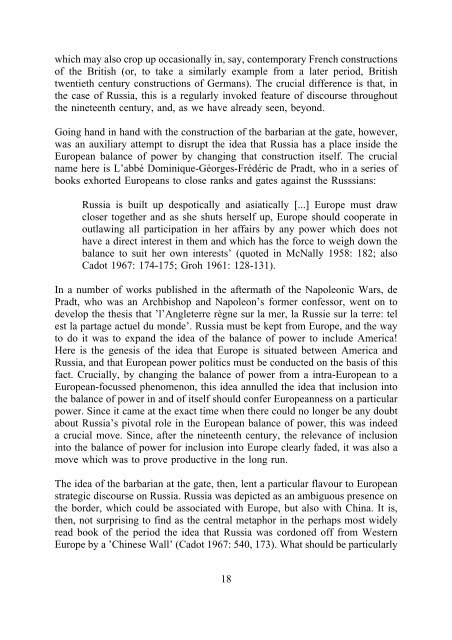RUSSIA AS EUROPE'S OTHER Iver B. Neumann European ...
RUSSIA AS EUROPE'S OTHER Iver B. Neumann European ...
RUSSIA AS EUROPE'S OTHER Iver B. Neumann European ...
Create successful ePaper yourself
Turn your PDF publications into a flip-book with our unique Google optimized e-Paper software.
which may also crop up occasionally in, say, contemporary French constructions<br />
of the British (or, to take a similarly example from a later period, British<br />
twentieth century constructions of Germans). The crucial difference is that, in<br />
the case of Russia, this is a regularly invoked feature of discourse throughout<br />
the nineteenth century, and, as we have already seen, beyond.<br />
Going hand in hand with the construction of the barbarian at the gate, however,<br />
was an auxiliary attempt to disrupt the idea that Russia has a place inside the<br />
<strong>European</strong> balance of power by changing that construction itself. The crucial<br />
name here is L’abbé Dominique-Géorges-Frédéric de Pradt, who in a series of<br />
books exhorted <strong>European</strong>s to close ranks and gates against the Russsians:<br />
Russia is built up despotically and asiatically [...] Europe must draw<br />
closer together and as she shuts herself up, Europe should cooperate in<br />
outlawing all participation in her affairs by any power which does not<br />
have a direct interest in them and which has the force to weigh down the<br />
balance to suit her own interests’ (quoted in McNally 1958: 182; also<br />
Cadot 1967: 174-175; Groh 1961: 128-131).<br />
In a number of works published in the aftermath of the Napoleonic Wars, de<br />
Pradt, who was an Archbishop and Napoleon’s former confessor, went on to<br />
develop the thesis that ’l’Angleterre règne sur la mer, la Russie sur la terre: tel<br />
est la partage actuel du monde’. Russia must be kept from Europe, and the way<br />
to do it was to expand the idea of the balance of power to include America!<br />
Here is the genesis of the idea that Europe is situated between America and<br />
Russia, and that <strong>European</strong> power politics must be conducted on the basis of this<br />
fact. Crucially, by changing the balance of power from a intra-<strong>European</strong> to a<br />
<strong>European</strong>-focussed phenomenon, this idea annulled the idea that inclusion into<br />
the balance of power in and of itself should confer <strong>European</strong>ness on a particular<br />
power. Since it came at the exact time when there could no longer be any doubt<br />
about Russia’s pivotal role in the <strong>European</strong> balance of power, this was indeed<br />
a crucial move. Since, after the nineteenth century, the relevance of inclusion<br />
into the balance of power for inclusion into Europe clearly faded, it was also a<br />
move which was to prove productive in the long run.<br />
The idea of the barbarian at the gate, then, lent a particular flavour to <strong>European</strong><br />
strategic discourse on Russia. Russia was depicted as an ambiguous presence on<br />
the border, which could be associated with Europe, but also with China. It is,<br />
then, not surprising to find as the central metaphor in the perhaps most widely<br />
read book of the period the idea that Russia was cordoned off from Western<br />
Europe by a ’Chinese Wall’ (Cadot 1967: 540, 173). What should be particularly<br />
18

















